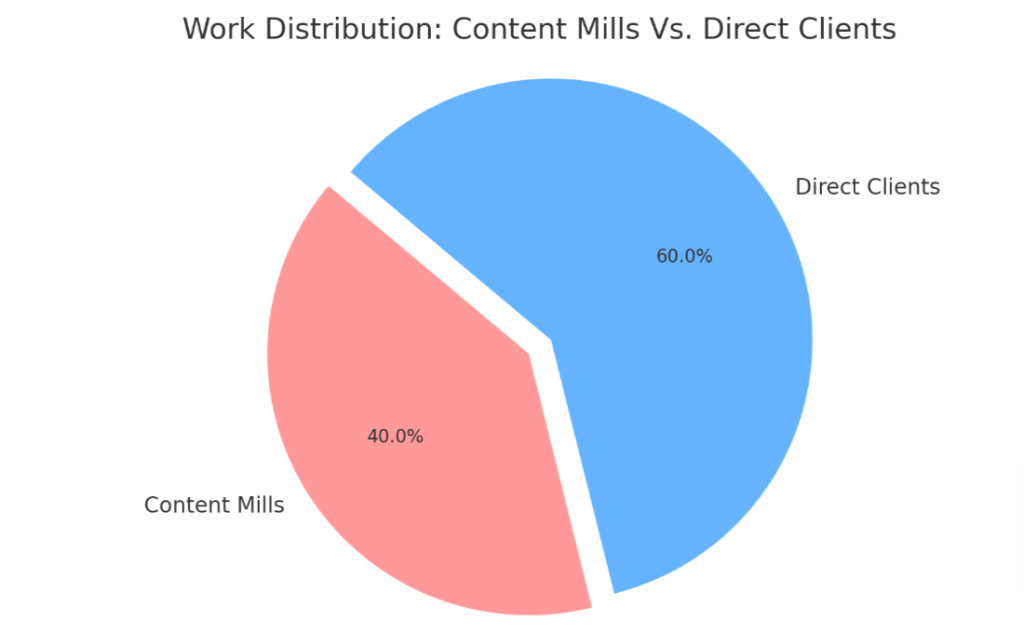Evaluating Earnings: Content Mills and Direct Client Pay Rates
Navigating the world of freelance writing can lead to a critical crossroad: should you opt for content mills or direct clients? Payscale reports that freelancers who work with direct clients earn up to 40% more than those working with content mills.
This blog post will unpack these two options, examining their pros and cons, and equipping you with practical insights on which path holds greater financial promise for your writing career.
Ready to start earning what you’re worth? Let’s dive in!
Key Takeaways
- Content mills connect writers with clients, but pay rates are generally lower compared to direct client work.
- Direct clients offer higher pay rates and more control over workload and topics.
- Consider your experience level, time management skills, and personal preferences when deciding between content mills and direct clients.
Understanding Content Mills
Content mills are platforms that connect writers with clients looking for content creation services, offering a wide range of writing opportunities and varying pay rates.
What are content mills?
Content mills, also known as content factories, operate as online platforms where writers connect with individuals or businesses needing written material. These companies usually have a vast pool of freelance writers who churn out articles, blog posts, product descriptions, and other types of web content at low prices.
While they offer an easy entry point for beginners in the writing industry, pay rates at these platforms can often be lower compared to direct client work.
Advantages and disadvantages for writers
Content mills can be a stepping stone for newbie writers or a steady income provider for some seasoned writers. However, there are also downsides of working with content mills. Let’s look at some of the key advantages and disadvantages:
| Advantages | Disadvantages |
|---|---|
| Readily available work: Content mills provide a constant stream of jobs, thus ensuring steady work availability. | Low pay rates: Generally, content mills pay less compared to direct clients, which can be discouraging for many writers. |
| No need for pitching: Unlike other freelance jobs, there’s no need to pitch for jobs or sell your services to clients. | Limited growth opportunities: Working with content mills might not provide significant growth or learning opportunities as the focus is on quantity over quality. |
| Payment security: Most content mills have a secure payment system in place, reducing the risk of non-payment. | Lack of control: Writers have less control over the topics they write about and deadlines, causing potential burnout. |
| Great for beginners: Content mills can be a great place to start for newbie writers looking to develop skills and build a portfolio. | Impersonal: The nature of work at content mills can be impersonal, often making writers feel like just another cog in the wheel. |
Remember, these pros and cons can vary depending on the specific content mill and the individual writer’s circumstances and preferences.
Examples of popular content mills
Many online platforms cater to freelance writers, offering them ample opportunities for content creation. Below are some popular content mills:
- Textbroker: This platform allows writers of various skill levels to get writing gigs.
- iWriter: A favorite among beginners, iWriter offers a plethora of writing jobs covering multiple niches.
- Constant Content: For experienced writers, Constant Content presents higher pay rates and a wider variety of topics.
- Zerys: Zerys is ideal for those who can handle big projects and want steady work.
- WriterAccess: This platform connects businesses with expert freelance writers for long-term partnerships.
- Content Gather: Writers can sell pre-written articles or take on custom assignments on this site.
- Copify: A UK-based platform welcoming international writers, it maintains a steady stream of copywriting work.
Direct Clients and Their Benefits
Direct clients offer higher pay rates and provide freelance writers with more control over their workload and topics, as well as the opportunity for long-term partnerships.
Higher pay rates
Direct clients offer higher pay rates compared to content mills. As a freelance writer, working directly with clients can be more financially rewarding. Direct clients usually have bigger budgets and are willing to pay competitive rates for high-quality content.
This means that you have the opportunity to earn more money for your writing skills and expertise. By choosing direct clients over content mills, you can increase your earning potential and achieve financial stability in your freelance writing career.
More control over workload and topics
Freelance writers who work with direct clients enjoy more control over their workload and the topics they write about. Unlike content mills, where assignments are often assigned randomly, working directly with clients allows writers to choose projects that align with their interests and expertise.
This not only leads to a higher level of job satisfaction but also enables writers to produce high-quality content that reflects their unique voice and perspective.
In addition, having more control over workload means freelance writers can set their own pace and manage their time more effectively. They have the freedom to prioritize projects based on deadlines and availability, allowing for a better work-life balance.
Moreover, by handpicking assignments that match their skills and passions, writers can further enhance their professional growth by gaining in-depth knowledge in specific niches or industries.
By taking on direct client work, freelance writers open themselves up to long-term partnerships as well. Building strong relationships with clients can lead to recurring writing gigs or even referrals from satisfied customers.
Opportunities for long-term partnerships
Direct clients offer freelance writers the opportunity to establish long-term partnerships. This means that instead of constantly seeking new writing gigs, you can develop ongoing relationships with clients who provide a consistent stream of work.
This stability allows you to focus on building your expertise in specific subjects or industries and can lead to higher pay rates over time. Long-term partnerships also enable you to have more control over your workload and schedule as you become familiar with the client’s needs and expectations.
By nurturing these relationships, you can create a steady income while fostering professional growth in the writing industry.
Factors to Consider in Choosing Between Content Mills and Direct Clients
Consider your experience level, time management skills, and personal preferences to make an informed decision. Read on to learn more.
Experience level
Experienced writers can benefit from working with direct clients as they often offer higher pay rates. Direct clients value expertise and are willing to pay more for high-quality content.
Freelancers with a strong portfolio and proven track record can negotiate better rates and secure long-term partnerships, ensuring a stable income source. Working directly with clients also allows writers to showcase their skills, build their reputation, and establish themselves as industry experts.
By taking on challenging projects and delivering exceptional work, experienced writers can boost their earning potential in the freelance writing industry.
Time management and flexibility
Managing time effectively and being flexible are crucial skills for freelance writers, whether they choose to work with content mills or direct clients. Freelancers who can effectively manage their time can maximize their productivity and take on more writing projects.
This involves setting clear goals, creating schedules, and prioritizing tasks. Being flexible allows writers to adapt to the changing demands of clients or platforms. It also enables them to balance different projects and meet deadlines efficiently without sacrificing the quality of their work.
By mastering time management and staying adaptable, freelance writers can thrive in the ever-evolving world of online content creation.
Personal preferences
When deciding between content mills and direct clients, personal preferences play a crucial role. Some writers prefer the structured environment of content mills, where they can easily access writing assignments and receive prompt payment.
Others may prefer working with direct clients because it allows for more flexibility in terms of workload and topics, as well as the opportunity to build long-term partnerships. Ultimately, it is important to consider what aligns best with your work style and goals when making this decision.
Which Option is Right for You?
Deciding which option is right for you ultimately depends on your experience level, time management skills, and personal preferences.
Weighing the pros and cons
Weighing the pros and cons of each option can provide clarity on which path may be best for you. Here’s a breakdown of some key points to consider:
| Pros of Content Mills | Cons of Content Mills | Pros of Direct Clients | Cons of Direct Clients |
|---|---|---|---|
| Easy to find assignments | Lower pay rates | Higher pay rates | Requires more self-marketing |
| No need for self-marketing | Limited creative control | Greater creative control | Potential for inconsistent work |
| Regular workflow | Quality of work may be undervalued | Opportunity to build long-term relationships | May demand more time and commitment |
| Potential for quick payments | No guarantee of continuous work | Can negotiate terms and conditions | Requires more administrative tasks |
Remember, what works best will depend on your individual circumstances and career goals.
Finding a balance
Finding a balance between working for content mills and direct clients is essential for freelance writers. While content mills may provide a steady stream of work, they often come with lower pay rates and limited control over assignments.
On the other hand, direct clients offer higher pay rates and more flexibility in choosing the topics you write about. It’s important to consider your experience level, time management skills, and personal preferences when deciding which option is right for you.
By weighing the pros and cons of both content mills and direct clients, you can find a balance that meets your financial needs while also providing job satisfaction and creative freedom.

Conclusion
In conclusion, when deciding between content mills and direct clients for freelance writing opportunities, it is important to carefully consider your experience level, time management capabilities, and personal preferences.
Content mills may offer a more steady flow of work but often at lower pay rates. On the other hand, working with direct clients can provide higher pay rates and more control over workload and topics.
Finding the right balance that suits your needs and goals is key in navigating the writing industry and achieving satisfaction as a freelance writer.

